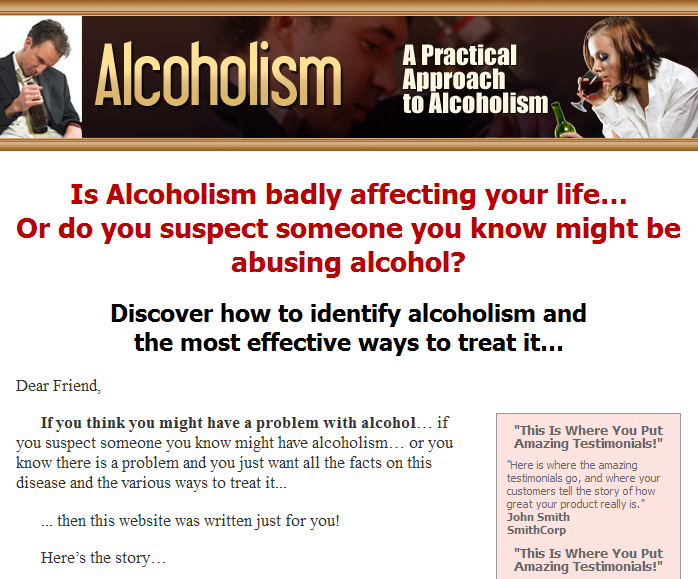Salespage Snapshot:

>>> Click Here To View Full Sales Page…
Table of Contents
1. Introduction
2. Alcohol abuse
3. Alcohol dependence
4. Types of problems related to alcoholism
5. Identifying the problem
6. Intervention
7. Diagnostic methods and screening tests
8. Genes and Alcoholism
9. Alcohol content detection tests
10. Is alcoholism a disease?
11. Medical implications of alcohol dependence
12. Biologically speaking….
13. Cardiomyopathy
14. Nervous system
15. Peptic Ulcer
16. Liver
17. Factors influencing ALD
18. Effect of alcohol on development of the brain
19. Dementia and alcoholism
20. Alzheimer’s disease among alcoholics
21. Tremors due to alcoholism
22. Alcoholism and digestive system
23. Some positive effects of moderate drinking
24. Alcohol consumption and risk of Cancer
25. How alcoholism affects family life
26. Psychological influence of alcohol in a family
27. Fetal Alcohol Syndrome
28. Children of Alcoholics – COA
29. Alcohol and adolescents
30. Adult children of alcoholics
31. Women and Alcohol
32. How family members further the drinking habit
33. Treatment options
34. Drug addiction Vs alcoholism
35. Craving
36. Relapse
37. Naltrexone for alcoholism treatment
38. Treating alcoholism with ondansetron
39. Alternative treatment for alcohol abuse
40. Cognitive behaviour therapy
41. The BAR Cycle
42. Herbal Remedies
43. Handling withdrawal symptoms
44. Treatment procedure for withdrawal symptoms
45. Including family in the therapy
46. Treating hangover
47. Myths and truth about alcoholism
48. Alcoholics anonymous
49. AA’s Twelve Steps for recovery
50. Happy family
Sample Content Preview
Introduction
Alcoholism is something that cannot be defined in simple terms. Alcoholism in general refers to the condition whereby there is a compulsion in man to keep consuming beverages with alcohol content which is harmful to health. The condition of alcoholism does not allow the person addicted to have any control over consumption in spite of being aware of the negative consequences resulting from it. Even if the person who is an alcoholic faces social ridicule, family pressure, abuses, insults, etc he is in a condition whereby he cannot give up the habit or obsession which is beyond his control. His senses are totally under the influence of alcohol and any kind of an effort put forth by him to give up the habit does not work. He is thus totally dependent on the beverage.
An alcoholic has such a craving to drink that even if he happens to get into alcohol related trouble like drunken driving, losing his job, etc it does not stop him from considering giving up the habit. Not everyone who consumes alcohol is an alcoholic. A person who consumes alcohol in limited quantities and is able to say no when he does not want to is not termed an alcoholic. He or she is just a social drinker.
One interesting theory proposed by writers is that alcohol in early days was discovered to replace the scarcity of unpolluted and safe drinking water. People preferred to die a slow death rather than dying overnight after drinking the extremely polluted and harmful water which carried many bacteria’s, viruses and diseases.
Alcohol abuse
Alcohol abuse refers to the condition when a person who is under the influence of the beverage refuses to stop the undesirable practice in spite of facing problems repeatedly. Problems could be social, legal or personal. Damage caused from this could be both at the physical and mental level.
People who are under influence of alcohol generally do not bother about the condition or situation when they consume the beverage i.e. they do not bother to stay away from drinks even if they have to necessarily drive. Due to this they are at a risk of getting into trouble with the law.
Personal problems may arise due to intolerance of family members towards the attitude of irresponsibility which invariably arises out of this condition. Personal relationships get affected and life becomes filled with tension, stress and complexes.
Social problems may include misbehaviour in public causing embarrassment to oneself, one’s family or friends who are around. People under the influence of alcohol generally tend to get loud and boisterous, or may become sober and melancholic. Their gait is also imbalanced and more often than not, they stagger and sometimes even fall down. They may even, without being conscious about it, abuse people around causing unpleasantness.
Other Details- 30 Articles (TXT)
- 2 Ebook (PDF, RTF), 60 Pages
- 7 Part Autoresponder Email Messages (TXT)
- 1 Salespage (HTML, RTF)
- 3 Ecovers (JPG)
- File Size: 3,536 KB













